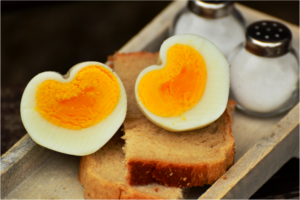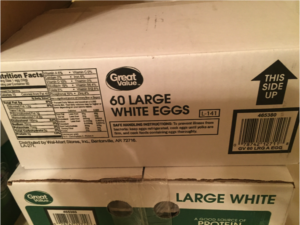Why Cholesterol Is Harmless
You really can’t trust official nutrition advice. You know this. Case in point: cholesterol. We can learn a lot from cholesterol.
They scolded you about it for decades. How it was really bad because it was sticky-icky and would cloggy-wog your arteries. Maybe you listened. But if you pored over your copy of the Scientific Report of the 2015 Dietary Guidelines Advisory Committee by candlelight, you stumbled on this little gem:
Previously, the Dietary Guidelines for Americans recommended that cholesterol intake be limited to no more than 300 mg/day. The 2015 DGAC will not bring forward this recommendation because available evidence shows no appreciable relationship between consumption of dietary cholesterol and serum cholesterol, consistent with the conclusions of the AHA/ACC Report. Cholesterol is not a nutrient of concern for overconsumption. [Emphasis mio.]This is the most official cholesterol stance in the United States. Health.gov.
Translation:
Remember how we always told you to cut down on cholesterol? Yeah, we're not saying that anymore. Science says there’s no link between the cholesterol you EAT and the cholesterol in your BLOOD—same word, different things (classic mixup). Shit, as far as we know, you could eat ten egg-yolks a day for 20 years without any heart trouble. Seriously! We're not joking. Our bad.
Joking aside (they didn’t really apologize), ten egg yolks is no joke. That’s what “not a nutrient of concern for overconsumption” and “no appreciable relationship” really mean.
These phrases don’t mean the former guidelines were sort of on the right track. They don’t mean it’s best to stick to one egg a day—moderation and such.
They don’t mean the truth is somewhere in the middle.
No, they mean something like this. If you had the technology and steady hand to isolate pure cholesterol from a greasy vat of steak and egg yolks, and you were to siphon this pure cholesterol into gallon jugs, and you were to take hearty, chin-dripping gulps from said pure cholesterol jugs whenever you got thirsty over the next 20 years, the top nutrition scientists in the US don’t have hard evidence that something bad would befall you.
Like, not even a heart murmur.
It’s now well-known that cholesterol from food has little impact on the average person’s blood cholesterol—and that food cholesterol intake has no significant impact on heart disease risk.
This recent, uh…shift...in official cholesterol thought was a long time coming. (We were years behind Europe and even India.)
It turns out that the food-cholesterol-is-harmless theory stands on uber solid ground.
Want a simple, practical proof that cholesterol isn't bad? Eggs.
If food cholesterol were bad for your heart, then eggs would be absolutely and unequivocally...bad for your heart. There is no escaping this logic. A single medium egg has a whopping 62% of the Daily Value for cholesterol, and eggs are by far the biggest source of cholesterol in the US diet.
But a 2016 meta-analysis of prospective cohort studies found “no clear dose-response trends” between egg consumption and heart-disease risk. (Though eating more eggs was associated with a 12% lower risk of stroke.)
Ditto a 2013 meta-analysis, which found “no significant association between egg consumption and risk of coronary heart disease or stroke.”

A clear instance of an egg-heart association.
(A meta-analysis—a summary of relevant studies on a topic—tends to mean a lot more than a single study.)
Ditto another 2013 meta-analysis, which found that eating more eggs “is not associated with increased risk of coronary heart disease or stroke.”*
You get it.
Eggs are absolutely loaded with cholesterol.
↓
Eating more eggs does not cause heart disease.
↓
Eating more cholesterol does not cause heart disease.
This sort of indisputable logic led to the clear-cut “not a nutrient of concern for overconsumption” and “no appreciable relationship” statements about cholesterol in the Scientific Advisory.
The matter is settled, scientifically.
But if you read the actual 2015-2020 Dietary Guidelines (which some Americans actually do, unlike the Scientific Advisory they're supposedly based on), you heard a much different tune.
A tune of stale myths, not modern science.
Let's break down the latest cholesterol advice from Dietary Guidelines.
The Key Recommendation from the 2010 Dietary Guidelines to limit consumption of dietary cholesterol to 300 mg per day is not included in the 2015 edition…So far, so good. (Batting 1000.)
… but this change does not suggest that dietary cholesterol is no longer important to consider when building healthy eating patterns.Translation:
While this is precisely what the removal of the cholesterol cap suggests, we can’t just say “we were completely wrong for the past 35 years."
As recommended by the IOM,[24] individuals should eat as little dietary cholesterol as possible while consuming a healthy eating pattern.Translation:
We want to sound legit here, so we’ll cite these random IOM guidelines from 2002. Hopefully no one checks that reference.
In general, foods that are higher in dietary cholesterol, such as fatty meats and high-fat dairy products, are also higher in saturated fats.Translation:
Despite strong and steadily mounting evidence to the contrary, we’re still saying saturated fat is bad—which seems like as good an ad hoc hypothesis for avoiding cholesterol as any other.
Strong evidence from mostly prospective cohort studies but also randomized controlled trials has shown that eating patterns that include lower intake of dietary cholesterol are associated with reduced risk of CVD, and moderate evidence indicates that these eating patterns are associated with reduced risk of obesity.Translation:
We won’t cite any actual evidence, but saying “strong evidence” should do. And although eating patterns have nothing meaningful to say about individual nutrients like cholesterol, most people don’t know that. Plus, “eating patterns” makes us sound reasonable and modern. In fact, let’s italicize that.
* * * *
This stuff is important. Whether the public thinks cholesterol is bad or not is not a trivial matter. The perceived healthiness of entire categories of food hang in the balance (oh hey, meat).
Putting aside meat for another day, there’s eggs. Eggs are whole foods—they come straight out of chickens (or the reverse?) with no added anything.®
Like most whole foods, eggs are full of nutrients—and the hyper-majority of these nutrients are in the yolk. Check it.
| Nutrient | Egg White | Egg Yolk |
| Vitamin A | 0% | 5% |
| Vitamin C | 0% | 0% |
| Vitamin D | 0% | 5% |
| Vitamin E | 0% | 2% |
| Vitamin K | 0% | 0% |
| Thiamin | 0% | 2% |
| Riboflavin | 9% | 5% |
| Niacin | 0% | 0% |
| Vitamin B6 | 0% | 3% |
| Folate | 0% | 6% |
| Vitamin B12 | 0% | 6% |
| Pantothenic Acid | 1% | 5% |
| Choline | 0.4 mg | 116 mg |
| Calcium | 0% | 2% |
| Iron | 0% | 3% |
| Magnesium | 1% | 0% |
| Phosphorus | 0% | 7% |
| Potassium | 2% | 1% |
| Zinc | 0% | 3% |
| Copper | 0% | 1% |
| Magnenese | 0% | 0% |
| Selenium | 9% | 14% |
Almost all the good stuff is in the yolk. Like Vitamin A, Vitamin D (rare in food), and choline—three things Americans don’t get enough of.
Choline isn’t a pop-culture, Yahoo!-article nutrient yet. But it plays many important roles (metabolically and neurally) in the body. Choline was crowned an “essential nutrient” by the Institute of Medicine in 1998, and choline deficiency is implicated in liver disease, heart disease, and (perhaps) neurological disorders.Oh, and egg yolks are the best source of choline out of any food on Earth.
* * * *

One crate costs $3.78. That's six cents an egg.
These eggs aren't pasture-raised or anything, but why let the pricey perfect negate the discount good?
By condemning cholesterol, authorities condemned (and are still condemning) a cheap, time-honored, whole-food, nutrient-rich breakfast staple: eggs.
This injustice paved the way for the fattening, white-flour army of bagels, cereal, pop-tarts, Eggo waffles, breakfast bars, and God-knows-what-other "low-cholesterol foods" that invaded breakfast.
(Eggs are much more slimming than bagels, for example.)
Thanks, Obama. (Just kidding.)
Repeat after me: cholesterol is not a dose-dependent heart toxin. Cholesterol is naturally found in every single cell in your body—right next to saturated fat (shudder).
Far from being heart poison, cholesterol controls the fluidity of cell membranes and is an essential precursor to steroid hormones, Vitamin D, and bile acids. As a little side hustle, cholesterol's also a structural component of lipoprotein particles.
In other words, cholesterol is utterly essential to Basic Life©—so much so that our bodies make gobs of cholesterol every day. That's right.
Only around a quarter of the total cholesterol in the average person's body comes from food—the rest is made by the liver. (Surprised?)
If you eat more cholesterol, guess what happens? Your liver makes less cholesterol.
For most people, it's just a harmless biofeedback loop—like if you drink more water, you pee more.
Finale
What's it all mean? Well, in our lifetime, we Mother Geese saw our precious egg yolks go from creepy crawly heart-attackers to something like…water.
We saw official government dietary positions embarrassingly discredited, fundamental premises about Healthy Foods utterly shattered. (Cholesterol is the tip of the iceberg.)
What are these shifting sands beneath our feet? Welcome to the wacky wild west of nutrition, where mists of confusion enfold mountains of uncertainty, and bureaucratic inertia ball-and-chains the forward march of progress.
But who could doubt its importance? Nutrition tells you what’s good to put in your mouth.
Let’s get into it together.
(The nutrition.)
*Both 2013 meta-analyses found that eating more eggs was associated with a lower risk of stroke, but it wasn't all good: diabetics—only diabetics—who ate more eggs got more heart disease. This diabeggtic thing was based on limited and maybe confounded data, but diabetics may have reason to limit their egg intake. (This does not apply to the general population, or "Gen Pop.")
For more posts like this, go here.
Ummmmmmmmmmmmmmmmmmmmmmmmmmmmmmmmmmmmmmmmmmmmmmmmmmmmmmmmmmmmmmmmmmmmmmmmmmmmmmmmmmmmmmmmmmmmmmmmmmmmmmmmmmmmmmmmmmmmmmmmmmmmmmmmmmmmmmmmmmmmmmmmmmmmmmmmmmmmmmmmmmmmmmmmmmmmmmmmmmmmmmmmmmmmmmmmmmmmmmmmmmmmmmmmmmmmmmmmmmmmmmmmmmmmmmmmmmmmmmmmmmmmmmnnmmmmmmmmmmmmmmmmmmmmmmmmmmmah amazing amazing amazing amazing amazing so cute lovely
Haha. Thanks alomgirhoseain!
Welcome boss i love you hahaha
Awesome!
Thanks cloud!
Felt relief. Thanks for this very educating blog @logicalfatloss. Shalom
Love this and I have shared this study with tons of my clients! There is still a misconception about how dietary cholesterol effects our health! Keep educating! :)
Thanks Anne! Glad you read it :)
Good post 👍👏 @logicalfatloss
Follow and upvote me hehe 🙏😁
Resteem bot Service! Boost Your Post. Send 0.100 SBD and your post url on memo and we will resteem your post on 5000+ followers from two different account.@stoneboy and @vimal-gautam.
Delegate STEEM POWER 10SP Or Any Amount Through v2.steemconncet.
well all its cholesterol hahaha nice post
Well said and we all need to hear this loud and clear .. at last!
It does beg the question whether there has been an actual movement to ween people off good food so pharma can pump bad 'medicine' into our bodies for that old timer profit. But then that would sound too conspiratorial wouldn't it ;-)
Upvoted and resteemed!
It is a very lovely egg.
Hi. I leave you my vote, I hope you can go through my blog